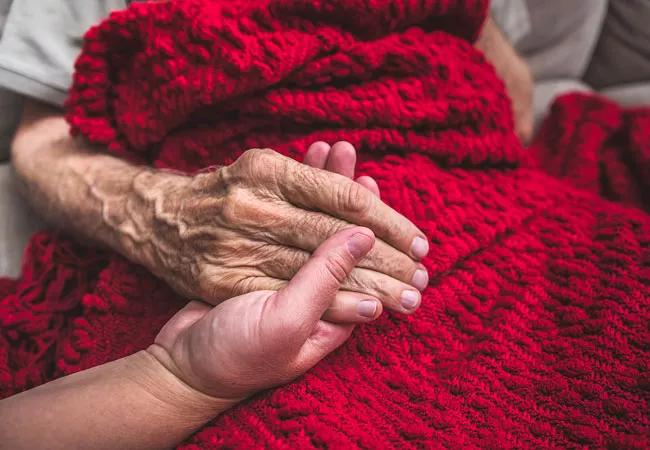End-of-life care may be modified, but it’s still meaningful

In April 2020, shortly after much of society shut down in response to the COVID-19 pandemic, a patient from Florida who had traveled to Cleveland Clinic’s main campus for a second opinion on an organ transplant became very sick. He began receiving hospice care at Justin T. Rogers, Cleveland Clinic’s inpatient hospice care center, but he wanted to go home to die.
Advertisement
Cleveland Clinic is a non-profit academic medical center. Advertising on our site helps support our mission. We do not endorse non-Cleveland Clinic products or services. Policy
“He thought we was going to die without ever seeing or touching his children and grandchildren again,” says Trisha Peace, BSN, RN, MHA, CHPN, assistant director of nursing for Cleveland Clinic Hospice. “We worked with Kris Adams, MSN, CNP, associate chief nursing officer of Care Management and Ambulatory Services, our hospice social workers and chaplains to get him home.” Peace accompanied the patient home, where he died on Easter in his bed surrounded by family.
These kinds of moments reflect the spirit of hospice nursing. “It is truly an honor to help patients and family members in this stage of their life journey,” says Peace. “We provide holistic care, rather than focus only on the symptom or disease. We look at the whole person and ask what we can do for them.”
Cleveland Clinic employs 120 hospice nurses and aides, who partner with physicians, volunteers, chaplains and social workers to provide compassionate care for people facing a life-limiting illness. Together they offer medical care, pain management and emotional and spiritual support based on each patient and family’s needs and wishes.
There are three groups of nurses at Cleveland Clinic Hospice: hospital coordinators work in all Cleveland Clinic hospitals, a community-based team travels to residential locations and a team of nurses provides inpatient end-of-life care at the Justin T. Rogers Hospice Care Center.
While the role and training of hospice nurses was covered in a 2017 article, Cleveland Clinic Hospice has continued to expand its services since then. Some of the newer services include the following:
Advertisement
Meaningful Meals: Local restaurants and bakeries donate meals that are served to patients and families in their homes to celebrate milestones, such as anniversaries and birthdays.
Caring Canines: Therapy dogs and their trainers provide support to patients and families.
Camp Promise: This three-day summer grief camp is open to adolescents ages six through 12 who have lost someone close to them. Typically held at the Justin T. Rogers Hospice Care Center, it has been conducted virtually during the coronavirus pandemic.
Virtual Reality Experience: Virtual reality (VR) headsets are available to provide a simulated experience that transports patients and families to destinations they’ve always wanted to see or special places that elicit life-long memories. The VR experience was suspended during the pandemic.
In 2020, Cleveland Clinic Hospice admitted and cared for more than 2,700 patients. During the first quarter of 2021, the team provided services to more than 700 patients. Despite the ongoing COVID-19 pandemic, hospice nurses continue to provide top-notch care.
“We’ve had to learn how to do things differently without impacting quality,” says Peace. “We’ve had to increase our connections by visiting patients more frequently or using technology to connect patients with families.” For instance, the care centers have tablet computers so family members who are unable or not allowed to visit in person can share video calls with patients.
In the past year, hospice nurses have also increasingly helped discharge patients from intensive care units, where they were enrolled in hospice, to their homes to die. Many of those patients require oxygen and would not survive the trip home following ventilator extubation, so nurses travel with the patients and extubate them at home surrounded by family members who are unable to visit them in the hospital.
Advertisement
Hospice nursing may look a bit different during the pandemic, but the drive and dedication of caregivers remains the same. Julie Leavell, RN, has been a member of Cleveland Clinic’s community-based hospice team for five years. She entered the field at the encouragement of her boyfriend (now husband), a hospice home health aide for the healthcare system.
“This job is a work of the heart. It will test you mentally, emotionally and physically, but it is truly wonderful,” says Leavell. “As hospice nurses, we see some of the most intimate parts of our patients’ and their families’ lives – a spouse saying goodbye, a child telling their parent goodbye. It’s an honor to do this work, and it has given me compassion for my fellow man and made me realize that we should never take our lives for granted.”
Advertisement
Advertisement

Multidisciplinary framework ensures safe weight loss, prevents sarcopenia and enhances adherence

Study reveals key differences between antibiotics, but treatment decisions should still consider patient factors

Key points highlight the critical role of surveillance, as well as opportunities for further advancement in genetic counseling

Potentially cost-effective addition to standard GERD management in post-transplant patients

Findings could help clinicians make more informed decisions about medication recommendations

Insights from Dr. de Buck on his background, colorectal surgery and the future of IBD care

Retrospective analysis looks at data from more than 5000 patients across 40 years

Surgical intervention linked to increased lifespan and reduced complications